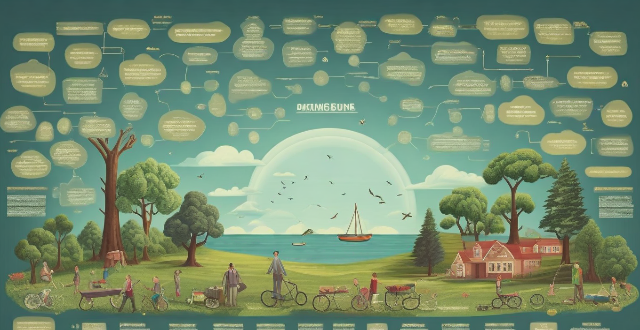The text discusses the significance of environmental ethics in sustainable development, emphasizing its role in recognizing the importance of the environment, promoting stewardship and responsibility, encouraging sustainable practices, addressing environmental justice issues, and fostering collaboration and partnerships. It highlights that by understanding the interconnectedness of all life on Earth, we can make more informed decisions about how to use and protect natural resources. The text also points out that environmental ethics promotes the idea of stewardship, which involves taking responsibility for protecting and preserving the environment for future generations. Furthermore, it encourages sustainable practices such as recycling, reducing carbon emissions, and using eco-friendly products to reduce our impact on the environment and contribute to long-term sustainability. Additionally, the text emphasizes the importance of addressing environmental justice issues to ensure fair access to natural resources and protection from environmental harm. Finally, it suggests that environmental ethics fosters collaboration and partnerships between individuals, communities, governments, and businesses to work together towards sustainable development goals.

The Role of Environmental Ethics in Sustainable Development
Introduction
Sustainable development is a concept that emphasizes meeting the needs of the present without compromising the ability of future generations to meet their own needs. It involves balancing economic, social, and environmental considerations to ensure long-term sustainability. Environmental ethics plays a crucial role in this process by providing a framework for making ethical decisions about the environment.
Key Points
1. Recognizing the Importance of the Environment
Environmental ethics helps us recognize the importance of the environment and its resources for human well-being and survival. By understanding the interconnectedness of all life on Earth, we can make more informed decisions about how to use and protect natural resources.
2. Promoting Stewardship and Responsibility
Environmental ethics promotes the idea of stewardship, which involves taking responsibility for protecting and preserving the environment for future generations. This includes reducing waste, conserving energy, and using renewable resources whenever possible.
3. Encouraging Sustainable Practices
Environmental ethics encourages sustainable practices such as recycling, reducing carbon emissions, and using eco-friendly products. These practices help reduce our impact on the environment and contribute to long-term sustainability.
4. Addressing Environmental Justice Issues
Environmental justice is an important aspect of environmental ethics, as it addresses issues related to fair access to natural resources and protection from environmental harm. By promoting environmental justice, we can ensure that all people have equal opportunities to enjoy a healthy environment.
5. Fostering Collaboration and Partnerships
Environmental ethics fosters collaboration and partnerships between individuals, communities, governments, and businesses to work together towards sustainable development goals. This includes sharing knowledge, resources, and best practices to achieve common objectives.
Conclusion
Environmental ethics plays a vital role in sustainable development by providing a framework for making ethical decisions about the environment. By recognizing the importance of the environment, promoting stewardship and responsibility, encouraging sustainable practices, addressing environmental justice issues, and fostering collaboration and partnerships, we can work towards a more sustainable future for all.